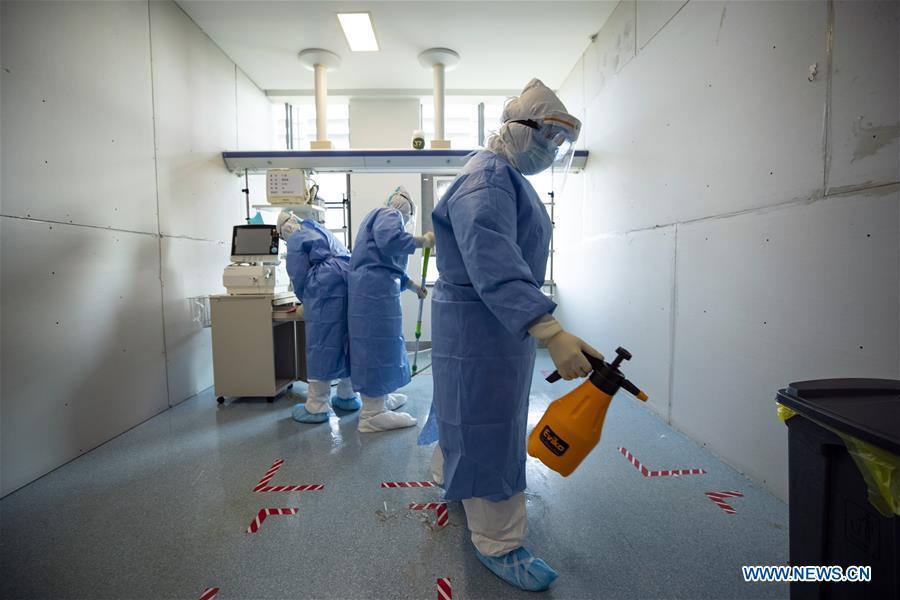
A street in the blocked Mea Shearim neighborhood in Jerusalem amid the coronavirus pandemic, April 12, 2020. /Xinhua
A street in the blocked Mea Shearim neighborhood in Jerusalem amid the coronavirus pandemic, April 12, 2020. /Xinhua
Editor's note: Mustafa Hyder Sayed is the executive director of the Pakistan-China Institute. The article reflects the author's opinions and not necessarily the views of CGTN.
As the world struggles to contain and combat the biggest battle that it has seen post-World War II, there are key lessons to be learned and drawn for the future.
There is no room for protectionism and unilateralism. COVID-19 attests to the fact that global challenges can only be addressed with global cooperation. No one country has the ability, capacity and wherewithal to address big challenges by themselves.
Learning from COVID-19, the leading economies and global powers of the world should use it as an opportunity to set "new rules of the game," with a strategic consensus, as bare minimum as it may be, to have an institutionalized mechanism of addressing challenges of such magnitude, which also promote their shared interests of stability and a functional economy.
While economic might and military muscle may distinguish first world countries from developing countries, challenges like COVID-19 do not distinguish and discriminate.
In fact, the U.S., albeit being the world's superpower, is the second most adversely affected by the coronavirus and may soon replace Italy as the most ravaged by the pandemic.
COVID-19 reminds us how egalitarianism has faded into a distant dream, an illusion, and a lesson taught in schools. The gap and disconnect between the rich and the poor have increased manifold, as has the gap between rich countries and those considered in the "periphery."
We need to rebalance the inequalities and reorient the system of institutionalized exploitation of resource-rich countries with poor populations. Africa has 30 percent of the world's resources, yet its inhabitants are economically marginalized, why? This is a good time to ask ourselves this question.
The United States should shift its international relations manifesto from realpolitik and neorealism to a more principles-based approach. The theory of "American Exceptionalism" is, ultimately, at the cost of other countries.
As the superpower of the world, the U.S., and other leading economies like China, must take more responsibility. Taking more responsibility includes better trade terms with lesser developed economies, more allocation of funding on global health research against pandemics and other diseases, increasing "no-strings-attached" assistance to developing countries for access to clean water, education and basic health care.

Staff of Tongji Hospital affiliated to Huazhong University of Science and Technology clean and disinfect a ward after all patients were transferred, Wuhan, central China's Hubei Province, April 12, 2020. /Xinhua
Staff of Tongji Hospital affiliated to Huazhong University of Science and Technology clean and disinfect a ward after all patients were transferred, Wuhan, central China's Hubei Province, April 12, 2020. /Xinhua
COVID-19 reaffirms that China's Belt and Road Initiative (BRI) is a step in the right direction.
The BRI is a broad-based, inclusive development agenda based on a win-win approach, mutual respect and extensive consultation. Cutting across narrow parochial and political interests, it seeks to engage the world to develop together and upgrade globalization to "globalization 2.0" in harmony.
Additionally, the Health Silk Road, which is part of the Belt and Road Initiative, is relevant now more than ever. The BRI and its Health Silk Road should be embraced, not politicized. Should any one or country have a better idea than the Health Silk Road or the BRI that matches or improves on the existing financial commitments made by China, they should go ahead and announce that, but media slander and misinformation that demonizes China and the Communist Party of China must end.
COVID-19 is being labeled as World War III against an invisible, unknown, forbidding and ruthless enemy. Except this time, the war was fought by brave men and women who were doctors and nurses, not armies.
The world needs to go beyond appreciation – health care should be elevated in the global list of priorities and health care professionals should be given higher compensation and a better social safety net. The United Nations and the UN Security Council can play a role in this.
The coronavirus has been a silver lining for the Earth. The Earth seems to be healing while its inhabitants are on lockdown. Pollution is clearing up, and the world's flora and fauna are resurrecting.
Unfortunately, the lack of action on climate change despite much political rhetoric shows that human existence was taking place at the cost of other life on Earth. As arguably the wisest and most resourceful of all beings on Earth, it is our responsibility to live more responsibly and compassionately.
Alvin Toffler was correct when he said, "The illiterate of the 21st century will not be those who cannot read and write, but those who cannot learn, unlearn and relearn." Now is a good time for us to do all three.
(If you want to contribute and have specific expertise, please contact us at opinions@cgtn.com.)